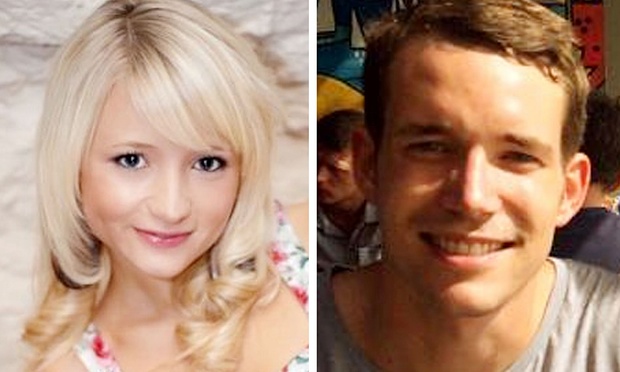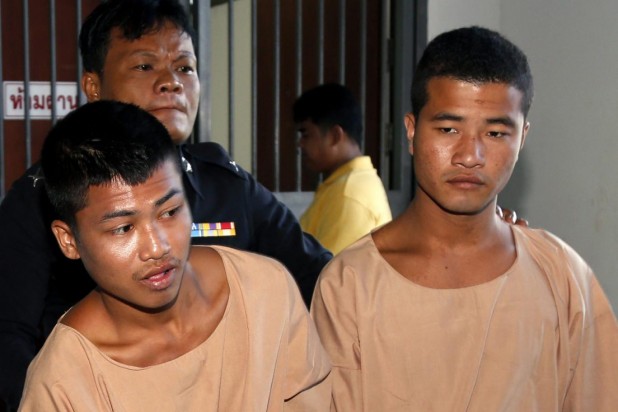BBC News, ‘Thailand beach murders: A flawed and muddled investigation’, 24 Dec 2015 (emphasis added):

Hannah Witheridge and David Miller were found brutally murdered in September last year.
From the moment their bodies were discovered on a Thai beach on 15 September last year, the investigation into the deaths of British backpackers Hannah Witheridge and David Miller has been a muddled affair.
Information from the police has been hazy, contradictory and sparse.
Miss Witheridge, 23, from Norfolk, and 24-year-old Mr Miller, from Jersey, were found bludgeoned to death on the southern island of Koh Tao.
The first officers on the scene were local police with rudimentary training and apparently no idea how to seal off a crime scene, with tourists wandering through it for days afterwards.
Thailand’s best-known forensic scientist, Dr Pornthip Rojanasunand, whose institute was not allowed any involvement in the investigation, testified at the trial that the crime scene had been poorly managed and evidence improperly collected.
Instead of limiting their comments to what they knew about the crime, the Thai police threw out a barrage of speculation about who the culprit might be. It could not have been a Thai, they said at first, and focused their efforts on the Burmese migrant worker community.

The case has brought widespread media attention to Thailand and the island resort.
At one point they highlighted a British friend of Mr Miller as a possible suspect, then just as quickly dropped him. The initial team of investigators hinted they were looking at someone from a powerful family on Koh Tao. Then their commander was abruptly transferred and all official talk of this family’s involvement was dropped.
Other flaws were exposed once the trial started in July, including the police’s failure to test Miss Witheridge’s clothes or the alleged murder weapon, a blood-stained hoe, for DNA.
A year later Dr Pornthip tested the hoe and found the DNA of two people on the handle, but none matched the defendants.
The court heard several CCTV cameras near the crime scene were not working and cameras by the pier were not inspected to see whether anyone had fled by boat after the crime.
Both defendants have also testified they were beaten and threatened into making confessions. No lawyers were present during the sessions and translators were of dubious reliability.
These factors raised serious questions over the integrity of the prosecution case. The most important question though, hung over one piece of evidence which did tie the defendants to the crime: the alleged match between their DNA, and that recovered from semen found on Miss Witheridge’s body.
Less than three days after the crime, police announced they had extracted the DNA profiles of two men from the semen. They also said these matched DNA found on a cigarette butt near the scene.
In court, a police officer testified those samples were received on the morning of 17 September and started DNA extraction at 08:00 local time. This seems unlikely as the pathologist only started his autopsy at 11:00. The successful profiling of two men was announced at around 22:00.
It suggests remarkably rapid analysis, in less than 12 hours, from samples in which at least three people’s DNA - the victim and the two men - were mixed.
The DNA profiles were used to match cheek swabs taken from the two Burmese defendants after they were detained on 2 October.
Jane Taupin, a renowned Australian forensic scientist brought in by the defence team, questioned the plausibility of working this quickly, saying extracting DNA from mixed samples was difficult and time-consuming.
Ms Taupin was not allowed to testify, one of several inexplicable decisions by the defence, but she highlighted several important aspects of DNA testing which neither the defence team, the police, nor the judges appeared to understand.
How DNA testing works

Questions surrounding the alleged guilt of Wai Phyo and Zaw Lin in the murder of the young British couple.
DNA analysis is a complex procedure which requires meticulous care and documentation. Contrary to popular belief, it does not offer “perfect matches”, only statistical probabilities.
Almost all DNA - 99.9% - is likely to be the same between two people. That distinct 0.1% is made up of what are known as “short tandem repeat” sequences. These are isolated and examined for patterns which offer a statistical likelihood of a match to other DNA samples.
Usually a reference sample from a third party is also analysed.
The statistical likelihood of the match must be demonstrated in court, with full documentation showing methodology, proof the samples have not been contaminated and peer review.
In the Koh Tao case, the prosecution provided only a one-page summary of their DNA tests, some of it handwritten, with parts crossed out and corrected, along with four supporting pages.
“The case files of the Thai forensic lab should have been provided to the defence,” Ms Taupin said.
“This is so the scientific data contained within, and used to provide conclusions, could be examined for a scientific review.
“The essence of scientific method is the testing and review of hypotheses. If these are not viewed, or even stated, then this does not inspire confidence in the scientific analysis.
“A one-page table with alterations is not a suitable document to provide to a court. A report should not have alterations, especially handwritten ones, with no explanation as to why they were altered.”
There were other problems too. The date of the original DNA analysis was said to have been 17 September, but the report submitted to court was dated 5 October. This was two days after the police had announced a positive match with the two Burmese defendants. That unexplained discrepancy inevitably raises suspicion that perhaps the result was manipulated.
These weaknesses in the prosecution case should have given the defence a field day in court, but they were not raised until the closing statement.
The two police forensic witnesses were not cross-examined over the doubtful timings nor the scrappy and incomplete DNA documentation.
Had Ms Taupin been called, she could have exposed these flaws. Instead, she had to sit in the lawyers’ room, largely ignored, and then fly home without testifying. Whatever views the three judges formed of the quality of the prosecution’s evidence, it was never properly challenged in court.
I have asked one of the defence lawyers about their bafflingly non-adversarial tactics. He did not offer a convincing explanation.
Perhaps they were nervous of being seen to take too much advice from a foreigner, for fear they would lose sympathy from the judges.
Everyone in that court was aware how much Thailand’s reputation was on the line, and discrediting the police in such a public way might have felt like a dangerous step to take. We just don’t know.
This remains one of a number of frustrating unknowns about this murder case. These can only have added to the suffering of the victims’ families.
How could these kinds of ‘oversights’ actually come to manifest in Thailand? Not only are questions raised regarding the two Burmese migrant worker suspects, but additional questions are raised about the context giving rise to the murder and flawed investigation. A look at the context, where members of wealthy and powerful families on Koh Toh had grounds or had created grounds for the crime, directs inquiry further into how such persons manage to create these grounds, to cover their interests and manipulate the justice system.
The political situation in Thailand since 2014 would have to be taken into consideration. The Shinawatra government had enjoyed popular support from the public because its socioeconomic base was the working class in cities and the rural semi-peasant farmers, also known as the red shirts, who it was responsive to and whose policies it catered to. When the yellow shirts, the royal family, the military and international liberals decided that they want to overthrow the Shinawatra government in a coup, they installed particular military personnel and politicians who were beholden to rich liberal businessmen and bankers in the south of the country, who then proceeded to do whatever they wanted to do.
It doesn’t require much imagination to see how it could be that the justice system, the safety of tourism, priorities and perceptions of international relations would become structurally compromised as a result.
The conflict between the yellow shirts and the red shirts, and the multinational implications of it, as well as the domestic issues it centred around such as the national health service, rice subsidies, forced prostitution and human trafficking, as well as the divergent social basis of the yellow shirts when compared to the red shirts, is something that will be covered in a future article on the subject.
One thing is clear in summary though, and it is that the most degenerate social tendencies and the most retrograde economic forces were able to rise to preponderance after the effective yellow shirt victory during the coup in 2014.

Posted by Murder in Paradise on Fri, 23 Nov 2018 12:19 | #
Murder in Paradise, BBC documentary on the beach murders.